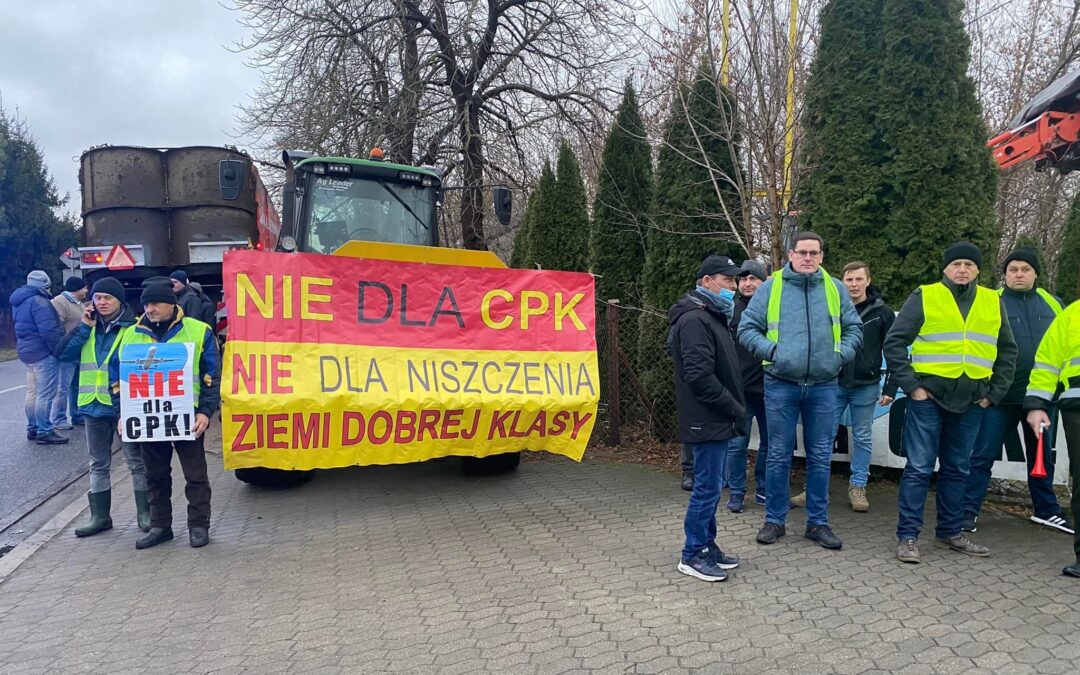Local residents have protested plans to bulldoze a number of villages to make way for a new “mega-airport” being created by the government between the cities of Warsaw and Łódź.
The protests – which saw opponents of the project interrupt a town hall meeting and throw eggs at officials – came after the government delineated a proposed site for the planned Solidarity Transport Hub (CPK), which will also include new road and rail connections.
The planned investment area will span 41 square kilometres, according to deputy infrastructure minister Marcin Horała, who is responsible for the CPK project. The site includes 520 properties and 3,800 residential plots, and is currently inhabited by around 1,000 people.
– Obszar preferowanej lokalizacji #PortSolidarność #CPK @STH_Poland obejmuje ok. 41 km kw. i jest o połowę mniejszy od wcześniejszego terenu rezerwacji – @mhorala @MI_GOV_PL I @RadioGdansk https://t.co/sphhMeLumX pic.twitter.com/4cqnMV9SzY
— Centralny Port Komunikacyjny (@STH_Poland) December 17, 2021
Horała said the delineation aimed to “minimise negative social effects” by limiting the number of “collisions with existing buildings” and “important cultural sites” such as cemeteries. He said the area also fulfilled environmental, technical and economic criteria.
The final location will be determined following an environmental study next year, said Mikołaj Wild, who is CEO of CPK. Once a decision on location is issued, CPK will begin buying up real estate for construction.
But protests are already mounting in response to the online publication on Wednesday of a list of 20 villages that would be bulldozed to make room for the investment. The following day, farmers from the area interrupted a town hall meeting – causing officials to suspend it – and demanded that Horała or Wild show up.
“You don’t have our consent for evictions. We will not agree to deportations,” shouted the protesters, reports Onet. One woman at the meeting told the news website: “If you want to take our lands by force, I will mine my fields and if necessary I will blow up with them.”
As representatives of CPK attempted to leave the building, protesters threw eggs in their direction.
“This is the largest, most unfair expropriation of the largest number of people in recent times in Poland,” said Michał Kołodziejczak, leader of the Agrounia farmers’ association, which has led an ongoing series of protests around the country. “This how the authorities behave…If they cannot do something officially, they will take a side route.”
In response to what he called “attacks”, Wild later tweeted that the organisers of the meeting – a so-called “social council” – “was no longer a partner in dialogue for us, as it is not able to ensure the safety of our people”. He later added that consultations would be held with individual residents.
Osoby podające się za mieszkańców pod wodzą @EKOlodziejczak_ zaatakowały pracowników #CPK zaproszonych przez Radę Społeczną. Od dzisiaj RS przestaje być dla nas partnerem w dialogu, skoro nie jest w stanie zapewnić bezpieczeństwa naszym ludziom. Odmawiamy udziału w „ustawkach”.
— Mikołaj Wild (@MikolajWild) December 16, 2021
In October, CPK announced that it has started buying the first plots of real estate for the project and signed a €6.5 million deal for an investment masterplan.
Later that month, the first eviction was ordered. The elderly couple in question had refused to make way for the development, arguing that their compensation was too low.
CPK is a flagship project of the Polish government, which argues that the airport can become a major international hub. It has pressed ahead with the plans despite the pandemic, though it recently admitted that the airport may now have to focus more on air freight than passenger traffic.
But critics of the project, including the political opposition, have argued that the plan is an unnecessary use of vast state resources. They note that the pandemic has dramatically reduced air travel and that the hub model is becoming less relevant.
Main image credit: Agrounia/Facebook

Maria Wilczek is deputy editor of Notes from Poland. She is a regular writer for The Times, The Economist and Al Jazeera English, and has also featured in Foreign Policy, Politico Europe, The Spectator and Gazeta Wyborcza.




















